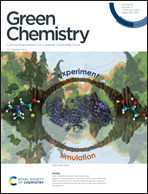Catalytic processes for the direct synthesis of dimethyl carbonate from CO2 and methanol: a review
Abstract
The direct synthesis of dimethyl carbonate (DMC) from CO2 and methanol has recently attracted much attention because such a process would allow the application of green chemistry principles. However, its major drawbacks lie in the high stability of CO2 and in the thermodynamic equilibrium of the reaction. The present review aims to discuss strategies that have been explored by researchers recently to improve the yield of DMC. Elaborate catalysts for the activation of CO2 and methanol, such as organometallic catalysts, ionic liquids, alkali metal catalysts, heteropolyacid catalysts, metal-supported catalysts, metal organic frameworks (MOFs) and metal oxide catalysts, are summarized and discussed in this review paper. Moreover, the significance of using a dehydrating agent for in situ water trapping during the reaction (and concomitant thermodynamic equilibrium shift), such as molecular sieves, ionic liquids, acetals, esters and nitriles, is also considered and the detailed roles of dehydrating agents in the formation of DMC are analyzed in this review.

- This article is part of the themed collections: Green Chemistry Reviews and Green Chemistry Reviews


 Please wait while we load your content...
Please wait while we load your content...